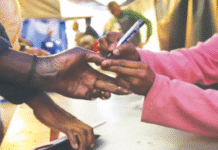Dialogue opens new doors in Bangladesh’s politics

On this issue, John Stuart Mill – the 19th century British philosopher – offered a thoughtful account of how democracies should function. He noted that democracies should harness mechanisms through which competing interests or objectives of societal, economic or political actors are addressed through discussions – vis-à-vis – “a government by discussion”. Developing these mechanisms is pertinent because sincere deliberation facilitates the narrowing of the gap between groups who “govern” and masses who are “governed”.
But are there any pre-conditions that societies must meet before a political landscape can attain such a civilised political arrangement? Can dialogue exist even if some political actors don’t play by the democratic rules? More importantly, are there any fundamental democratic rules that all parties aspiring to deepen democracy must respect? As human civilisation modernised, one of the core achievements of the democratic fabric was to ensure politics does not become a “zero-sum” game for all the actors involved. In other words, democracies offer a space for the coexistence of political groups with competing interests and ideological positions. And no political group must violate that principal condition on which everything else depends.
 Unfortunately, the political history of Bangladesh has been devoid of such civilised arrangements. Not only do we have witnessed the brutal assassination of the father of the nation Bangabandhu Sheikh Mujibur Rahman and his close family members on the Aug 15, 1975, the nation saw the enactment of a law – The Indemnity Act 1979 – by the members of the ruling political group – BNP – responsible for the assassination, which prohibited the judiciary from holding the perpetrators accountable for their heinous actions. In some sense, justice was not only delayed, it was obstructed. And whatever bridge that was established between the Awami League and the BNP in the 1980s as they mobilised public support against the military regime – that soft understanding was fundamentally severed when BNP’s leadership plotted to assassinate Sheikh Hasina on Aug 21, 2004 through a brutal grenade attack that resulted in the in the death of 24 Awami League activists and injured more than 300 people. Since then, the acute trust deficit that has plagued Bangladesh’s politics has never been eased, and the BNP has only amplified its severity by failing to take a truthful or socially acceptable position on the incident. In fact, by frequently promoting leaders who were found guilty of executing the heinous attack, the party has shown that it has no interest to push the nation out of zero-sum dynamics.
Unfortunately, the political history of Bangladesh has been devoid of such civilised arrangements. Not only do we have witnessed the brutal assassination of the father of the nation Bangabandhu Sheikh Mujibur Rahman and his close family members on the Aug 15, 1975, the nation saw the enactment of a law – The Indemnity Act 1979 – by the members of the ruling political group – BNP – responsible for the assassination, which prohibited the judiciary from holding the perpetrators accountable for their heinous actions. In some sense, justice was not only delayed, it was obstructed. And whatever bridge that was established between the Awami League and the BNP in the 1980s as they mobilised public support against the military regime – that soft understanding was fundamentally severed when BNP’s leadership plotted to assassinate Sheikh Hasina on Aug 21, 2004 through a brutal grenade attack that resulted in the in the death of 24 Awami League activists and injured more than 300 people. Since then, the acute trust deficit that has plagued Bangladesh’s politics has never been eased, and the BNP has only amplified its severity by failing to take a truthful or socially acceptable position on the incident. In fact, by frequently promoting leaders who were found guilty of executing the heinous attack, the party has shown that it has no interest to push the nation out of zero-sum dynamics.
 That is why there is a serious need to understand the magnitude of what was achieved on Nov 1, 2018. For the first time in almost a decade and a half since the barbaric grenade attack on Prime Minister Hasina, her government has decided to sit across the table with a political party which was directly responsible for executing the cruel plot. Not only has the BNP as a political party failed to address the trust deficit emerging from the heinous attack, but they have ridiculed the seriousness of the issue for last 14 years. That is why it is pertinent that BNP and the leaders of the Jatiya Oikya Front must understand that the dialogue marks the beginning of a new working relationship. And they should aim to not only to address their concerns about the institutional arrangements needed for holding a free, fair and participatory election, but they should go a step further and try to heal the old wounds that they have inflicted.
That is why there is a serious need to understand the magnitude of what was achieved on Nov 1, 2018. For the first time in almost a decade and a half since the barbaric grenade attack on Prime Minister Hasina, her government has decided to sit across the table with a political party which was directly responsible for executing the cruel plot. Not only has the BNP as a political party failed to address the trust deficit emerging from the heinous attack, but they have ridiculed the seriousness of the issue for last 14 years. That is why it is pertinent that BNP and the leaders of the Jatiya Oikya Front must understand that the dialogue marks the beginning of a new working relationship. And they should aim to not only to address their concerns about the institutional arrangements needed for holding a free, fair and participatory election, but they should go a step further and try to heal the old wounds that they have inflicted.
Of course, if they remain opportunistic about the possible scope of this dialogue and only focus on issues that suit them, then it is unlikely that the true potential of the ongoing dialogue can be realised. On the whole, a bit of pragmatism will take all parties a long way as the ongoing political dialogue has opened new doors in Bangladeshi politics, which deserves sincere appreciation. And no one must fail to capitalise on this new beginning – especially not the BNP. More simply: dialogue is better than violence – and if the BNP fails to accept that bitter truth, they will be the ones responsible for their political mistakes, not anyone else.









